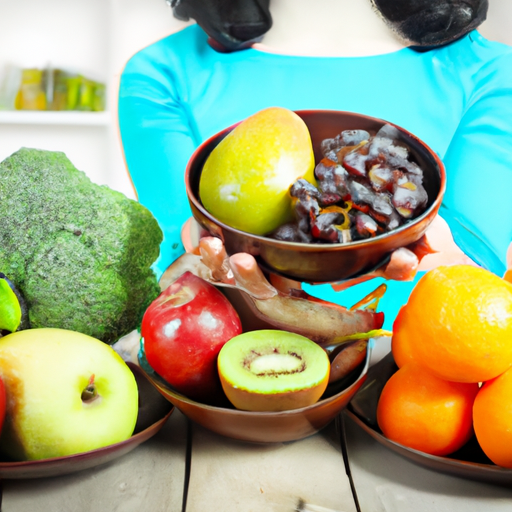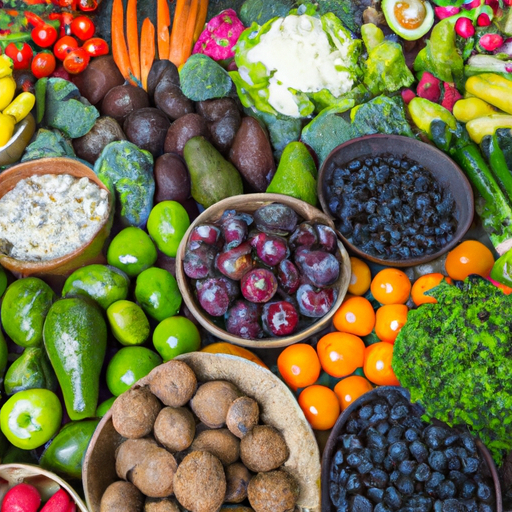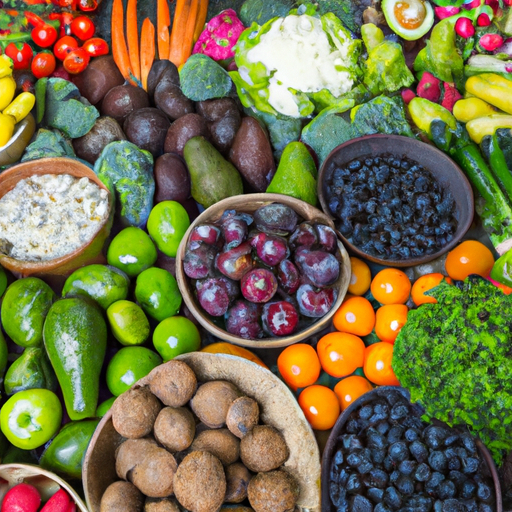So you’re considering becoming a vegetarian, but you’re worried about how it might impact your performance in sports? Well, let me assure you, you absolutely can be a vegetarian and still excel in athletics. In fact, many professional athletes have chosen to adopt a vegetarian or vegan diet and have achieved remarkable success.
When it comes to sports, proper nutrition plays a crucial role in performance, and being a vegetarian doesn’t mean you have to compromise on the nutrients your body needs. In fact, a well-planned vegetarian diet can provide you with all the essential macronutrients like protein, carbohydrates, and fats, as well as important micronutrients like vitamins and minerals. There are plenty of plant-based protein sources such as tofu, legumes, and quinoa that can help you meet your protein needs.
Furthermore, being a vegetarian can actually have numerous benefits for athletes. Plant-based diets are often rich in antioxidants and anti-inflammatory compounds, which can aid in muscle recovery and reduce oxidative stress. Additionally, vegetarian diets are typically lower in saturated fats and cholesterol, which can be beneficial for heart health and overall well-being.
If you’re still unsure about how to make the transition to a vegetarian diet while maintaining your performance in sports, don’t worry! There are plenty of resources available, from nutritionists specializing in sports performance to vegetarian athletes who have shared their experiences and tips. So, rest assured that being a vegetarian doesn’t have to hinder your sports performance – in fact, it might just enhance it!

Benefits of Being a Vegetarian Athlete
Increased Endurance
As a vegetarian athlete, you may experience increased endurance due to the high intake of complex carbohydrates and fiber from plant-based foods. These nutrients provide a steady release of energy, enabling you to sustain physical activity for longer periods without feeling fatigued. By fueling your body with nutrient-dense plant foods, you can enhance your endurance levels and push through challenging workouts or competitions.
Better Recovery
Plant-based diets are rich in antioxidants and anti-inflammatory compounds, which can contribute to faster recovery times. Consuming a variety of fruits, vegetables, whole grains, and legumes can help reduce oxidative stress and inflammation caused by intense exercise. This means less muscle soreness, improved muscle repair, and a quicker return to training after rigorous workouts.
Reduced Inflammation
Animal products, particularly those high in saturated fats, can contribute to inflammation in the body. By eliminating or minimizing these foods from your diet, you may experience reduced chronic inflammation. This can be especially beneficial for athletes, as chronic inflammation is linked to various health conditions and can impede recovery and performance. A vegetarian diet rich in plant-based foods can help promote overall health by reducing inflammation and supporting optimal athletic performance.
Key Nutrients for Vegetarian Athletes
Protein
Protein is essential for muscle repair, growth, and maintenance, making it a crucial nutrient for athletes. While animal products are commonly associated with protein intake, vegetarian athletes can easily meet their protein needs through plant-based sources. Legumes, such as lentils, beans, and chickpeas, are excellent sources of protein. Additionally, other plant-based protein sources include quinoa, soy products like tofu and tempeh, and wheat protein known as seitan. By incorporating a variety of these foods into your diet, you can ensure sufficient protein intake to support your athletic endeavors.
Iron
Iron is vital for oxygen transport in the body, as it is a key component of hemoglobin, the molecule responsible for carrying oxygen to your muscles and organs. Vegetarian athletes should pay close attention to their iron intake, as plant-based sources of iron are not as readily absorbed as those from animal products. However, many plant foods contain iron, including spinach, lentils, tofu, and chickpeas. By including these iron-rich foods in your diet and pairing them with vitamin C-rich foods to enhance absorption, you can maintain adequate iron levels for optimal athletic performance.
Calcium
Calcium is essential for bone health, which is particularly important for athletes who put increased stress on their bones during training and competition. While dairy products are the most well-known sources of calcium, there are numerous plant-based alternatives. Leafy greens, such as kale and broccoli, are excellent sources of calcium, as are almonds, chia seeds, and fortified plant milks. By incorporating these foods into your diet, you can support strong bones and overall skeletal health.
Vitamin B12
Vitamin B12 is primarily found in animal-based foods, making it a nutrient of concern for vegetarian athletes. This vitamin plays a crucial role in red blood cell production and neurological function. While some plant-based foods such as nutritional yeast and fortified plant milks may contain B12, it is recommended to supplement or consume fortified foods to ensure adequate intake. Consult with a healthcare professional to determine the most suitable form and dosage of B12 supplementation for your needs.
Omega-3 Fatty Acids
Omega-3 fatty acids are beneficial for athletes due to their anti-inflammatory properties and potential to enhance exercise performance. While fatty fish is a common source of omega-3s, vegetarian athletes can obtain these essential fats from plant-based sources such as chia seeds, flaxseeds, walnuts, and hemp hearts. Including these foods in your diet can help support joint health, reduce inflammation, and optimize athletic performance.
Sources of Plant-Based Protein
Legumes
Legumes, such as lentils, beans, and chickpeas, are excellent sources of protein for vegetarian athletes. They are versatile and can be incorporated into a variety of dishes, including stews, salads, and veggie burgers. Legumes also provide fiber and various other nutrients, making them an ideal choice for plant-based protein.
Quinoa
Quinoa is a complete protein, meaning it contains all essential amino acids necessary for muscle repair and growth. This grain-like seed is also a good source of complex carbohydrates, fiber, and minerals like magnesium and iron. Including quinoa in your diet provides a nutritious and protein-rich option for vegetarian athletes.
Soy Products
Soy products, such as tofu and tempeh, are staple foods in vegetarian and vegan diets. These traditional soy foods are versatile and can be used in a wide range of recipes, from stir-fries to sandwiches. They are rich in protein, iron, and calcium, making them excellent choices for vegetarian athletes looking to meet their nutritional needs.
Seitan
Seitan, also known as wheat protein or vital wheat gluten, is a popular meat substitute for vegetarian athletes. It has a chewy texture and can be seasoned and cooked in various ways to mimic the taste and texture of meat. Seitan is high in protein and low in fat, making it an ideal choice for those seeking to increase their protein intake while avoiding excessive fat consumption.
Tempeh
Tempeh is a fermented soy product that is highly nutritious and rich in protein and other essential nutrients. It has a nutty flavor and a firm texture, making it a versatile ingredient in vegetarian dishes. Like soy products, tempeh also contains iron and calcium, making it a valuable addition to a vegetarian athlete’s diet.
Iron-Rich Foods for Vegetarian Athletes
Spinach
Spinach is a leafy green vegetable that is not only rich in iron but also packed with antioxidants, vitamins, and minerals. Adding spinach to your salads, stir-fries, and smoothies can help boost your iron intake, supporting muscle function and overall performance.
Lentils
Lentils are a versatile legume that is an excellent source of iron for vegetarian athletes. They are also high in fiber and other nutrients, making them a great addition to soups, stews, and salads. Lentils come in various colors and sizes, including green, red, and black, each offering their unique taste and texture.
Tofu
Tofu, made from soybeans, is not only a great source of plant-based protein but also contains iron. It is a versatile ingredient that can be used in a variety of recipes, from stir-fries to smoothies. Choose from soft, firm, or extra firm tofu depending on your preference and the desired texture of your dish.
Chickpeas
Chickpeas, also known as garbanzo beans, are not only high in iron but also provide a good amount of protein and fiber. They can be used in salads, soups, curries, and even roasted for a crunchy snack. Including chickpeas in your diet can help ensure a sufficient intake of iron for optimal athletic performance.

Plant-Based Sources of Calcium
Leafy Greens
Leafy greens, such as kale, collard greens, and broccoli, are excellent plant-based sources of calcium. These vegetables are not only rich in this essential mineral but also provide other important nutrients like vitamin K and folic acid. By including leafy greens in your diet, you can support bone health and overall athletic performance.
Almonds
Almonds are not only a nutrient-dense snack but also a source of calcium for vegetarian athletes. Including a handful of almonds in your daily diet can help meet your calcium needs and provide healthy fats, protein, and fiber. Enjoy them as a snack, blend them into smoothies, or use them as a topping for salads and stir-fries.
Chia Seeds
Chia seeds are incredibly nutritious and contain a good amount of calcium, along with omega-3 fatty acids, fiber, and antioxidants. They can be soaked in liquids to create delicious chia puddings or added to smoothies, yogurt, or baked goods to boost calcium intake.
Fortified Plant Milks
Fortified plant milks, such as almond milk, soy milk, or oat milk, are excellent alternatives for those following a vegetarian diet. Many brands fortify their plant milks with calcium, ensuring that they provide similar levels of this mineral as dairy milk. Use fortified plant milks as a replacement for dairy milk in your favorite recipes or enjoy them on their own.
Getting Enough Vitamin B12 as a Vegetarian Athlete
Supplements
Vitamin B12 is primarily found in animal-based foods, making it essential for vegetarian athletes to consider supplementation. Vitamin B12 supplements are widely available and come in different forms, such as tablets, capsules, or sublingual drops. Consult with a healthcare professional to determine the appropriate dosage and form for your specific needs.
Fortified Foods
Some plant-based foods are fortified with vitamin B12, making them a viable option for vegetarian athletes. These include nutritional yeast, fortified plant milks, and some breakfast cereals. However, it is important to check the labels of these products to ensure that they contain adequate amounts of vitamin B12 to meet your nutritional requirements.
The Role of Omega-3 Fatty Acids in Sports Performance
Chia Seeds
Chia seeds are an excellent plant-based source of omega-3 fatty acids, specifically alpha-linolenic acid (ALA). These essential fats play a crucial role in reducing inflammation, improving cardiovascular health, and supporting brain function. Adding chia seeds to your diet can help enhance exercise performance and aid in post-workout recovery.
Flaxseeds
Flaxseeds are another rich source of omega-3 fatty acids, particularly ALA. Grind flaxseeds to release their full nutritional benefits, and add them to smoothies, oatmeal, or baked goods for an omega-3 boost. Incorporating flaxseeds into your diet can contribute to overall health and support athletic performance.
Walnuts
Walnuts not only offer a satisfying crunch but also provide a good amount of omega-3 fatty acids. They contain a type of omega-3 called alpha-linolenic acid (ALA), which has been shown to have numerous health benefits. Snack on walnuts, add them to salads or use them as a topping for yogurt or oatmeal to increase your omega-3 intake.
Hemp Hearts
Hemp hearts, also known as hemp seeds, are a complete protein source and an excellent source of omega-3 fatty acids. They have a mild, nutty flavor and can be sprinkled on salads, blended into smoothies, or added to baked goods. Including hemp hearts in your diet can help optimize sports performance by providing essential nutrients, including omega-3s.
Meal Planning Tips for Vegetarian Athletes
Balancing Macronutrients
As a vegetarian athlete, it’s important to ensure that your meals are well-balanced and provide the necessary macronutrients – protein, carbohydrates, and healthy fats. Include a variety of plant-based protein sources, such as legumes, tofu, and quinoa, to meet your protein needs. Incorporate whole grains, such as brown rice or whole wheat bread, for complex carbohydrates and include healthy fats from sources like avocados, nuts, and seeds.
Timing Meals Properly
Timing your meals around training sessions or competitions is vital for maximizing energy levels and optimizing performance. Prioritize consuming a meal or snack that contains carbohydrates and protein about 2-3 hours before exercise to provide sustained energy. After your workout, aim to consume a meal or snack within 30-60 minutes to support muscle repair and replenish glycogen stores.
Hydration
Staying hydrated is crucial for athletes, regardless of dietary preferences. Make sure to drink enough water throughout the day, both during exercise and at rest. Additionally, include hydrating foods, such as fruits and vegetables with high water content, in your meals and snacks to support optimal hydration levels.
Sample Vegetarian Athlete Meal Plan
Here’s a sample meal plan to give you an idea of how to incorporate plant-based foods into your diet as a vegetarian athlete:
Breakfast
- Overnight oats made with rolled oats, plant-based milk, chia seeds, and topped with berries and a sprinkle of chopped almonds.
- A glass of fortified orange juice for an extra vitamin C boost.
Mid-Morning Snack
- A small handful of mixed nuts and dried fruit.
- Greek yogurt with a tablespoon of ground flaxseeds.
Lunch
- Quinoa salad with roasted vegetables (such as bell peppers, zucchini, and eggplant) and a side of mixed greens dressed with olive oil and balsamic vinegar.
- A small handful of roasted chickpeas for added protein and crunch.
Afternoon Snack
- Apple slices with almond butter.
- A cup of green tea for a gentle energy boost.
Dinner
- Stir-fried tofu and vegetables (such as broccoli, carrots, and snow peas) with brown rice.
- A side of steamed spinach with a squeeze of lemon juice for added iron absorption.
Evening Snack
- A smoothie made with frozen berries, a banana, plant-based protein powder, and almond milk.
Remember, this is just a sample meal plan, and individual needs may vary. Adjust portion sizes and meal times to meet your specific requirements and preferences.
Conclusion
In summary, being a vegetarian athlete is absolutely possible, and with proper planning and attention to key nutrients, you can still perform well in sports. By consuming a variety of plant-based foods, you can benefit from increased endurance, better recovery, and reduced inflammation. It is essential to ensure adequate intake of key nutrients such as protein, iron, calcium, vitamin B12, and omega-3 fatty acids. Incorporating plant-based protein sources like legumes, quinoa, soy products, seitan, and tempeh can help meet your protein needs. Iron-rich foods such as spinach, lentils, tofu, and chickpeas can provide sufficient iron intake for optimal performance. Leafy greens, almonds, chia seeds, and fortified plant milks are excellent sources of calcium for vegetarian athletes. Vitamin B12 can be obtained through supplements or fortified foods. Omega-3 fatty acids can be sourced from chia seeds, flaxseeds, walnuts, and hemp hearts. With proper meal planning, which includes balancing macronutrients, timing meals properly, and staying hydrated, vegetarian athletes can achieve their performance goals. By fueling your body with plant-based foods, you can meet your nutritional needs and excel in sports. So, yes, you can definitely be a vegetarian and still perform well in sports!
